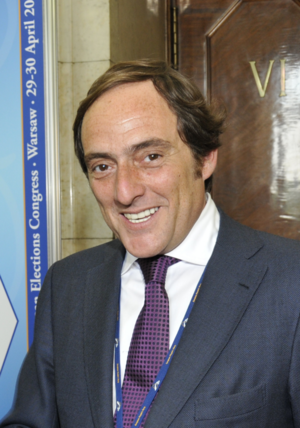Paulo Portas
( politician) | ||||||||||||||||
|---|---|---|---|---|---|---|---|---|---|---|---|---|---|---|---|---|
 | ||||||||||||||||
| Born | Paulo de Sacadura Cabral Portas 2 September 1962 Lisbon, Portugal | |||||||||||||||
| Nationality | Portuguese | |||||||||||||||
| Alma mater | Catholic University of Portugal | |||||||||||||||
| Siblings | • Miguel Portas • Catarina Portas | |||||||||||||||
| Party | CDS – People's Party | |||||||||||||||
Portuguese Defence & Foreign minister. Like his predecessor in both roles, Luís Amado, a single Bilderberger
| ||||||||||||||||
Paulo de Sacadura Cabral Portas is a Portuguese politician. From 1998 to 2005 and from 2007 to 2016 he was chairman of the conservative Centro Democrático e Social - Partido Popular. He was Minister of Defense between 2002 and 2005 and Minister of Foreign Affairs between 2011 and 2013. He attended the 2013 Bilderberg meeting.
Background
Paulo Portas was born on September 12, 1962 into a middle-class family in Lisbon.[1] His father Nuno Portas, a well-known architect, and his mother Helena Sacadura Cabral, a journalist and writer, separated five years later. Since then, Paulo Portas has lived with his mother, while his brother Miguel Portas, a leading member of the leftist Bloco de Esquerda until his death in 2012, grew up with his father.[1]
Education
He completed his education entirely at the Jesuit school Colégio São João de Brito in Lisbon, which is customary according to family tradition. Portas then studied law and journalism at the Catholic University of Lisbon. He gained fame in 1978 with his newspaper article Três Traições, (Eng. "Triple betrayal"), in which he criticized the three prominent politicians António dos Santos Ramalho Eanes, Diogo Freitas do Amaral and Mário Soares for their policy of decolonization after the Carnation Revolution in 1974. Immediately after the overthrow of the Portuguese dictatorship of the Estado Novo, Portugal released its colonies Angola, Cape Verde, Guinea-Bissau, Mozambique and São Tomé and Príncipe to independence in 1975.[1]
Career
Before he became actively involved in Portuguese politics, Portas was significantly active as a journalist. In 1988, together with Miguel Esteves Cardoso, he founded the weekly newspaper O Independente, which became known for exposing various scandals under the government of Aníbal Cavaco Silva (1985-1995), but was also criticized for its polemics.[1]
At the age of twelve, Paulo Portas joined the youth organization of the conservative-liberal Social Democratic Party and became a loyal supporter of the founder and later Prime Minister Francisco Sá Carneiro. However, after his death, in 1980, Portas was disappointed with the party leadership and decided to resign from party in 1983.[1]
In 1995, Paulo Portas became a member of the Portuguese Parliament as a representative of the Portuguese People's Party (CDS-PP), for which he gave up his activities as editor of the O Independente. Three years later, he was elected chairman of his party after a vote against Manuel Monteiro. In 1999 he was briefly a Member of the European Parliament. After the previously oppositional Social Democrats became the strongest force in the election to the Portuguese Parliament in 2002, but did not gain an absolute majority, Portas' party entered into a coalition with the Social Democrats. As chairman of his party, he took over the post of Minister of Defense and at the same time was Deputy Prime Minister under the Barroso] government. Even after Prime Minister José Manuel Barroso had become the head of the European Commission and Pedro Santana Lopes had taken over the post, Portas remained Minister of Defense.[1]
Portugal supported the US attack on Iraq in the spring of 2003 by sending Portuguese soldiers during Portas' term of office.[1]
After President Jorge Sampaio dissolved the parliament in 2005 under the government of Pedro Santana Lopes, new elections were required. In the vote on February 10, 2005, the CDS-PP suffered significant losses under Paulo Portas and only two of the previous 14 seats in parliament, so that he resigned from his offices on election night. He continued to be active as an opposition politician in the Portuguese Parliament.[1]
In the parliamentary election in June 2011, the bourgeois camp was able to record significant gains, so that the victorious Partido Social Democrata under Pedro Passos Coelho entered into a coalition with the smaller CDS-PP, Portas was significantly involved in the coalition negotiations. On 21 June 2011, President Cavaco Silva appointed him Minister of Foreign Affairs in the Passos Coelho cabinet, a post he held until 24 July 2013. Since July 24, 2013, he was Deputy Prime Minister in the Passos Coelho cabinet.[1]
Event Participated in
| Event | Start | End | Location(s) | Description |
|---|---|---|---|---|
| Bilderberg/2013 | 6 June 2013 | 9 June 2013 | Watford UK | The 2013 Bilderberg group meeting. |